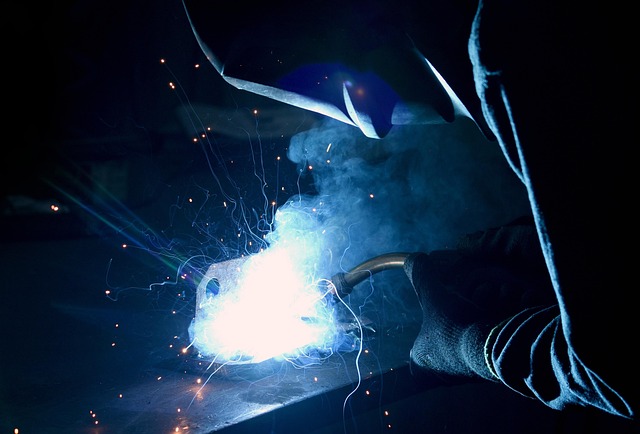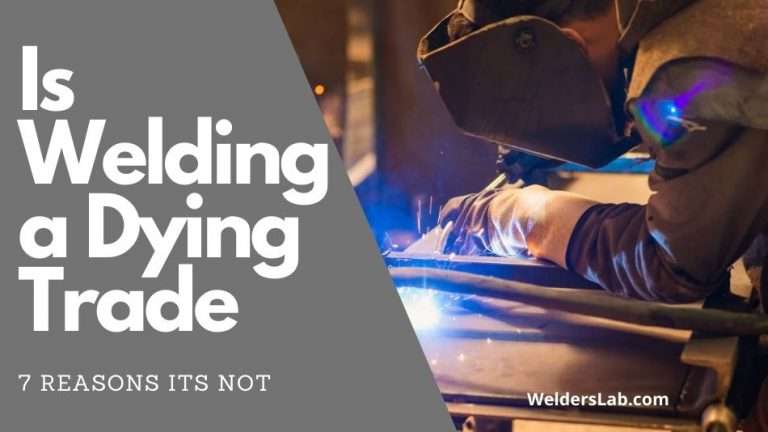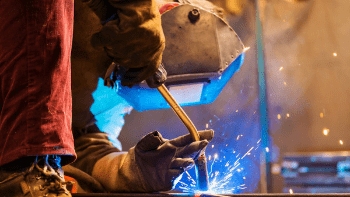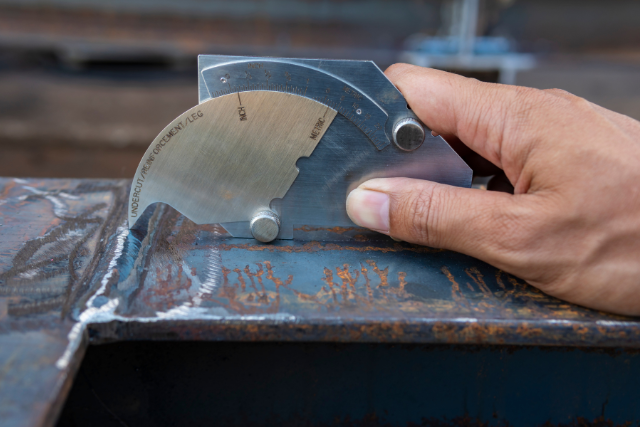15 Best Welding Careers – Salary’s, Experience & Growth
Thinking about becoming a welder, but not sure if this career is for you? You might be wondering how much welders make, what kind of experience you need, and, most importantly, whether there are many jobs available. According to Meritize, there are 49,200 expected job openings each year.
The best-paying welding jobs are underwater welding ($50k-$200k+), pipeline welding ($70k-$150k), and aerospace welding for planes and spacecraft. Specialized roles like nuclear welders and welding inspectors earn top dollar because they require extra skills and handle dangerous work.
Ready to discover the best welding jobs that could transform your future? In this article, I cover the 15 most promising welding careers that are revolutionizing the industry.
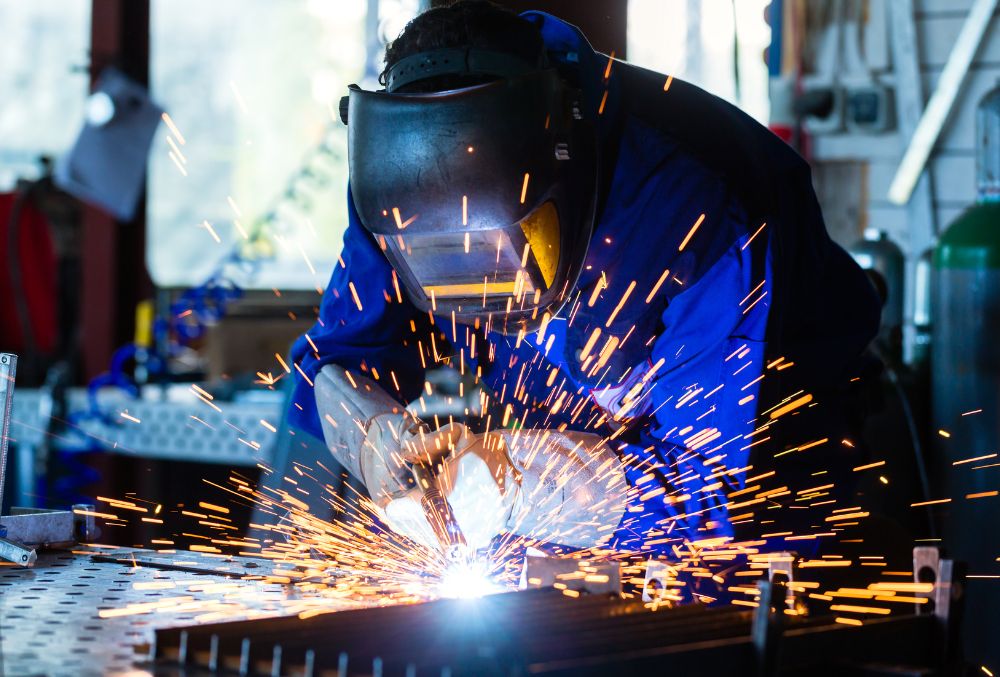
1. Underwater Welder: The Deep-Sea Daredevil
Average Salary: $75,000 – $200,000+
Experience Required: 5+ years commercial diving + advanced welding certification
Growth Outlook: Excellent
Underwater welding isn’t just a job—it’s an adrenaline-fueled adventure that pays like a CEO’s bonus. These underwater warriors repair offshore oil rigs, ship hulls, and marine infrastructure while battling currents and limited visibility.
Why It’s Hot:
- Highest earning potential in the welding world
- Extreme job satisfaction and uniqueness
- Critical infrastructure needs to ensure steady demand
The Reality Check: This is demanding work requiring commercial diving certification, advanced welding certification, and nerves of steel. However, for those who succeed, the financial rewards are extraordinary.
2. Pipeline Welder: The Road Warrior
Average Salary: $60,000 – $120,000
Experience Required: 2-4 years + pipeline-specific certifications
Growth Outlook: Strong (energy infrastructure boom)
Pipeline welding professionals are the nomads of the welding world, traveling from project to project across the country, building America’s energy infrastructure. These skilled craftspeople work on natural gas pipelines, oil transmission lines, and renewable energy projects.
What Makes It Appealing:
- High travel compensation and per diem allowances
- Compressed work schedules (work hard, rest longer)
- Essential role in energy independence
The Trade-Off: Expect to be away from home for months at a time, but the financial compensation and adventure factor are hard to beat.
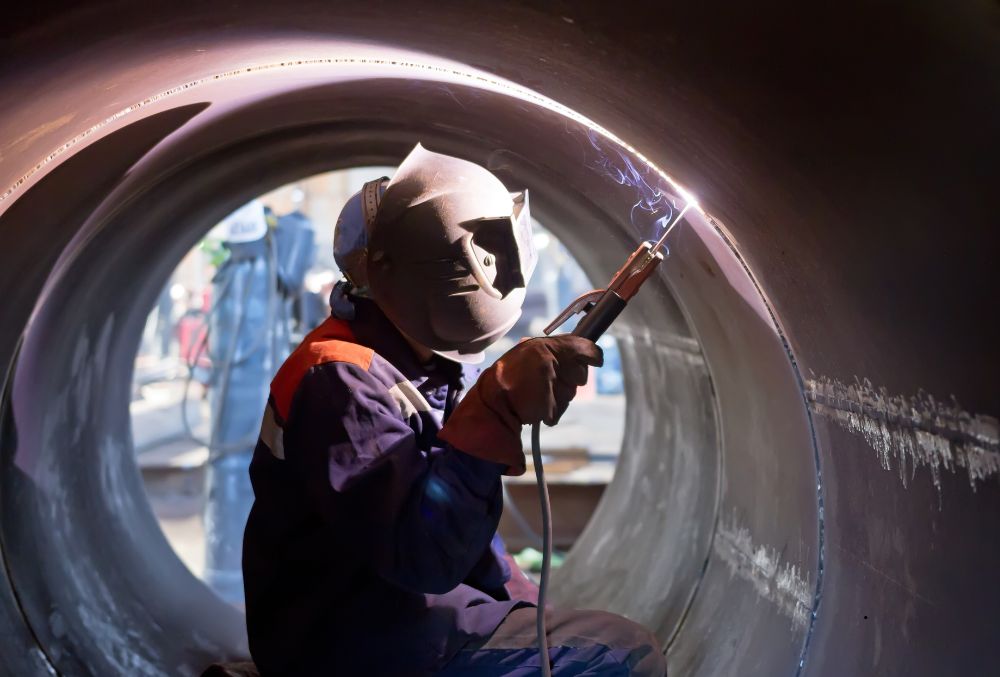
3. Aerospace Welder: Precision in the Stratosphere
Average Salary: $55,000 – $85,000
Experience Required: TIG welding expertise + aerospace certifications
Growth Outlook: Excellent (space race revival)
Aerospace welding jobs represent the pinnacle of precision welding. These professionals work on spacecraft, satellites, aircraft engines, and components that must perform flawlessly in extreme conditions.
Why It’s Stellar:
- Work on cutting-edge technology
- Excellent benefits and job security
- Prestige of contributing to space exploration
The Requirements: Expect rigorous background checks, precision TIG welding skills, and adherence to incredibly strict quality standards.
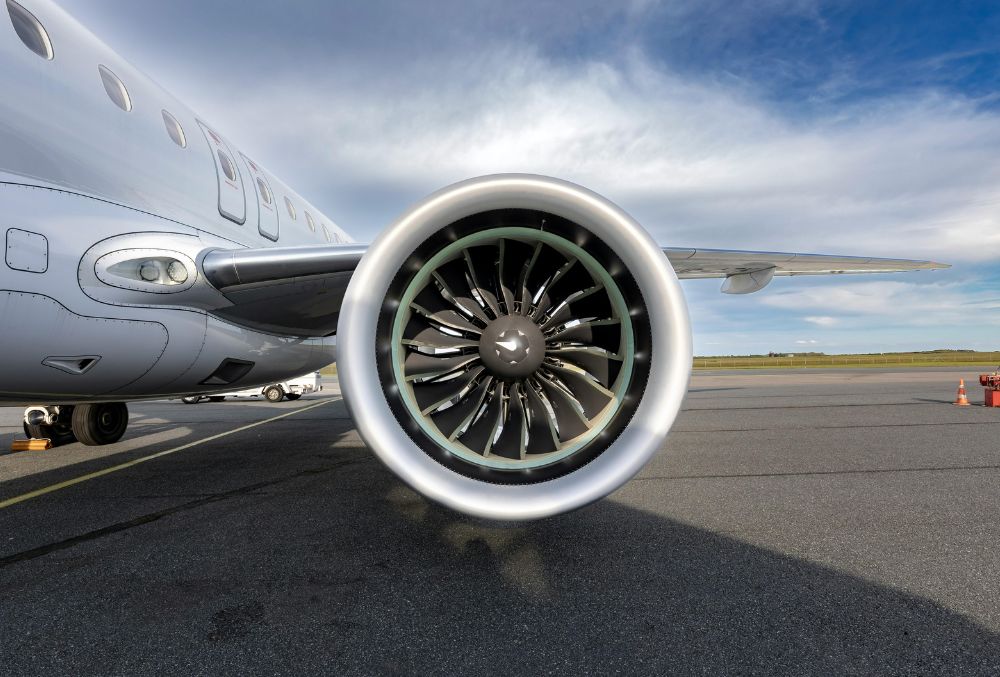
4. Nuclear Plant Welder: Power in Your Hands
Average Salary: $70,000 – $110,000
Experience Required: Nuclear-specific training + security clearance
Growth Outlook: Strong (nuclear renaissance)
Working in nuclear facilities requires specialized welding expertise and offers some of the highest compensation in the traditional welding world. These professionals maintain and construct critical infrastructure for clean energy production.
The Advantages:
- Premium pay for specialized skills
- Comprehensive benefits packages
- Job security in the growing clean energy sector
The Commitment: Extensive background checks, ongoing training, and adherence to strict safety protocols are non-negotiable.
5. Certified Welding Inspector (CWI): From Torch to Leadership
Average Salary: $65,000 – $95,000
Experience Required: 5+ years welding + AWS CWI certification
Growth Outlook: Excellent
Certified welding inspector jobs provide a natural career progression for experienced welders who are ready to transition from hands-on work to quality control and project management.
Career Benefits:
- Less physical demands than production welding
- Leadership opportunities and project oversight
- High demand across all industries
The Path: Requires extensive welding experience, passing the rigorous AWS exam, and developing strong communication skills.
6. Robotic Welding Technician: Embracing the Future
Average Salary: $50,000 – $75,000
Experience Required: Traditional welding + robotics programming training
Growth Outlook: Outstanding (automation expansion)
Robotic welding technician jobs represent the intersection of traditional craftsmanship and cutting-edge technology. These professionals program, maintain, and troubleshoot automated welding systems.
Future-Proof Features:
- Growing field with automation expansion
- A combination of technical and hands-on skills
- Less physical strain than traditional welding
The Learning Curve: Requires embracing technology and continuous learning, but offers excellent job security in an industry that is constantly evolving.
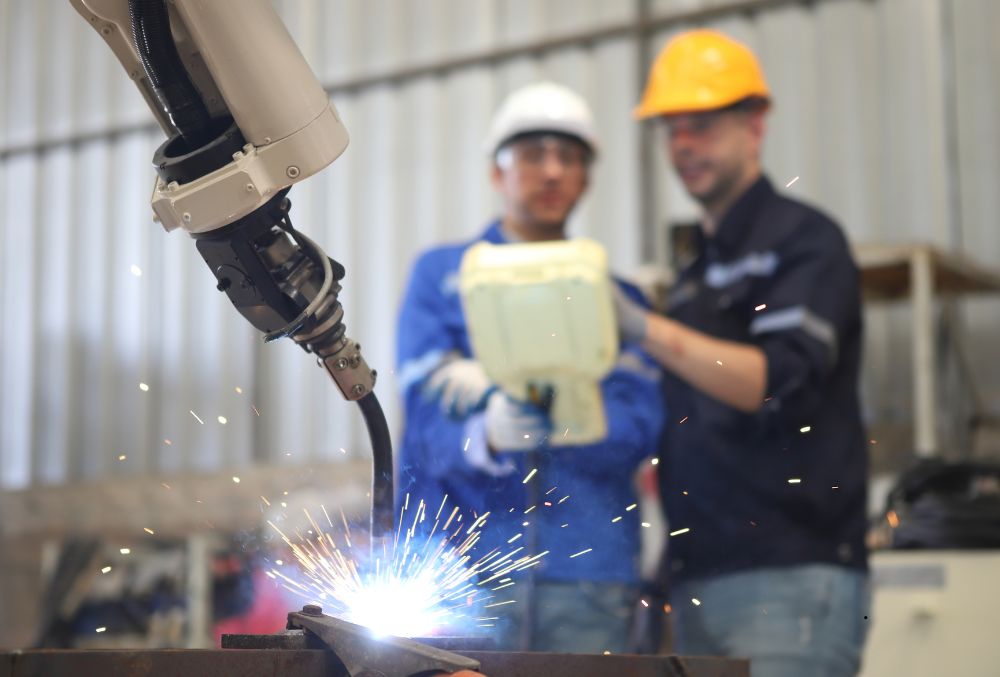
7. Shipyard Welder: Building Maritime Giants
Average Salary: $45,000 – $70,000
Experience Required: MIG welding + structural welding experience
Growth Outlook: Strong (military and commercial contracts)
Shipbuilding welding jobs are experiencing a renaissance with increased military spending and commercial shipping expansion. These professionals build everything from naval vessels to luxury cruise ships.
What’s Attractive:
- Stable, long-term employment
- Comprehensive benefits packages
- Pride in building massive, complex structures
The Environment: Large-scale projects, team-oriented work, and the satisfaction of seeing massive ships take shape under your torch.
8. Structural Steel Welder: Building America’s Backbone
Average Salary: $45,000 – $65,000
Experience Required: 1-3 years + structural welding certification
Growth Outlook: Strong (infrastructure investment)
Jobs for welders in construction are booming thanks to massive infrastructure spending. Structural welders build bridges, skyscrapers, stadiums, and the frameworks that define our skylines.
The Appeal:
- Variety in project types and locations
- Opportunities for overtime and project bonuses
- Visible impact on community development
The Reality: Height work, weather exposure, and physical demands, but solid middle-class earnings and job security.
9. Manufacturing Production Welder: The Industrial Backbone
Average Salary: $40,000 – $60,000
Experience Required: Basic certification + MIG welding skills
Growth Outlook: Steady
Manufacturing welder positions offer stability and benefits in automotive, appliance, and industrial equipment production. These roles provide excellent entry-level welding job opportunities.
Stability Factors:
- Predictable schedules and overtime opportunities
- Comprehensive benefits packages
- Clear advancement pathways
The Trade-Off: Repetitive work environment, but excellent training opportunities and job security.
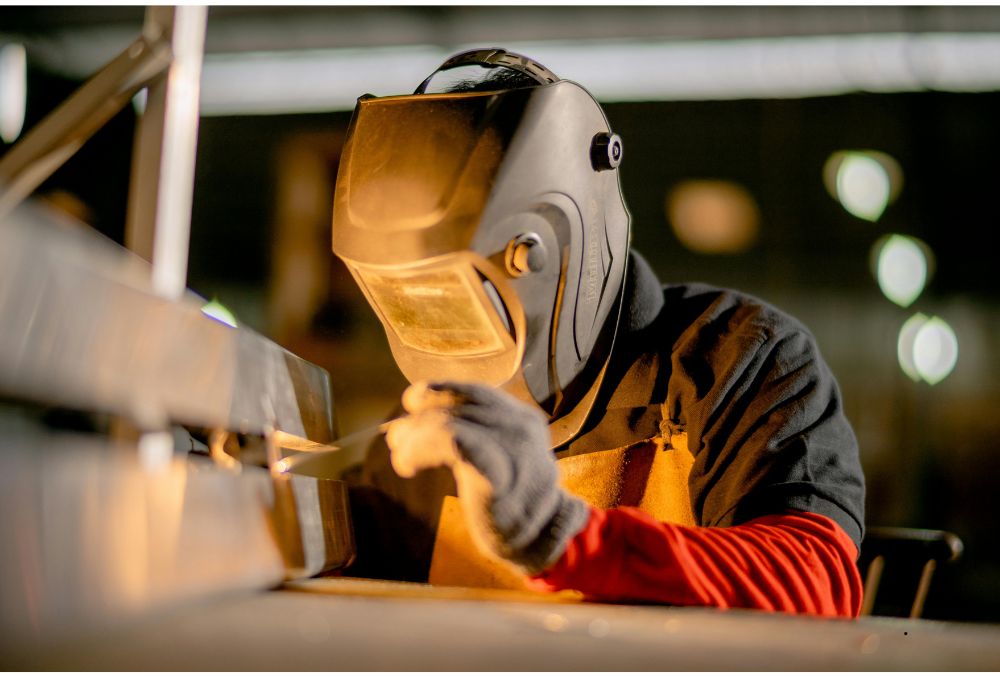
10. Boilermaker: High-Pressure Precision
Average Salary: $55,000 – $80,000
Experience Required: Specialized boilermaker training + pressure vessel certification
Growth Outlook: Good (power plant maintenance)
Boilermakers specialize in installing and maintaining boilers, pressure vessels, and other large containers holding liquids and gases. This specialized welding job requires precision and adherence to strict safety standards.
The Benefits:
- Specialized skills command premium pay
- Critical infrastructure role ensures demand
- Opportunities in power generation and industrial facilities
The Demands: Working in confined spaces, handling heavy materials, and meeting rigorous safety requirements.
11. Welding Engineer: The Technical Mastermind
Average Salary: $70,000 – $120,000
Experience Required: Engineering degree + welding expertise
Growth Outlook: Excellent
Welding engineers design welding procedures, select materials, and oversee large-scale welding projects. This career combines engineering principles with hands-on welding knowledge.
Professional Advantages:
- High earning potential and prestige
- Project leadership and design responsibility
- Opportunities across multiple industries
The Path: Requires engineering education plus extensive welding knowledge—the perfect blend of brain and brawn.
12. Maintenance Welder: The Problem Solver
Average Salary: $45,000 – $65,000
Experience Required: Multi-process welding skills + troubleshooting ability
Growth Outlook: Steady
Maintenance welders are the troubleshooters who keep industrial facilities running. They repair everything from conveyor systems to processing equipment, requiring versatility and quick thinking.
The Appeal:
- Variety in daily tasks and challenges
- Problem-solving satisfaction
- Essential role in facility operations
The Skills Needed: Proficiency in multiple welding processes, mechanical aptitude, and the ability to work under pressure.
13. Art and Sculpture Welder: Creative Fire
Average Salary: $35,000 – $75,000 (highly variable)
Experience Required: Artistic talent + TIG welding mastery
Growth Outlook: Moderate
For creative souls, artistic welding combines technical skill with creative expression. These professionals create sculptures, architectural features, and custom metalwork.
Creative Benefits:
- Artistic expression and creative fulfillment
- Unique, one-of-a-kind projects
- Potential for high-end custom work
The Reality: Income can be unpredictable, but successful artists command premium prices for custom work.

14. Welding Instructor: Passing the Torch
Average Salary: $45,000 – $70,000
Experience Required: Master-level welding skills + teaching credentials
Growth Outlook: Good (workforce development needs)
Welding training programs need experienced instructors to train the next generation. This career offers the satisfaction of sharing knowledge while maintaining a connection to the trade.
Teaching Rewards:
- Job satisfaction from developing new talent
- Regular schedule and benefits
- Staying current with industry developments
The Transition: Requires developing teaching skills alongside maintaining technical expertise.
15. Field Service Welder: The Traveling Specialist
Average Salary: $50,000 – $85,000
Experience Required: Multi-process certification + customer service skills
Growth Outlook: Good
Field service welders travel to customer sites for repairs, installations, and emergency services. This role combines technical expertise with customer interaction and problem-solving.
The Adventure:
- Travel opportunities and variety
- Premium pay for emergency services
- Direct customer interaction and relationship building
The Lifestyle: Unpredictable schedules and travel, but excellent compensation for specialized skills.
Breaking Into Your Dream Welding Career
What Qualifications or Certifications Are Needed to Become a Welder?
The pathway to these best welding jobs starts with solid foundational training. Here’s your roadmap:
Essential Certifications:
- AWS (American Welding Society) Certification: The industry gold standard
- ASME Certification: Required for pressure vessel and boiler work
- API Certification: Essential for pipeline and petrochemical industries
- Process-Specific Certifications: TIG, MIG, stick welding credentials
How Long Does It Take to Become a Professional Welder?
Timeline Breakdown:
- Basic Training: 6-18 months in welding training programs
- First Certification: Additional 3-6 months
- Journeyman Level: 2-4 years of experience
- Specialized Positions: 5-10+ years for premium roles
Welder Career Progression Timeline: From Training to Expertise
Explore the stages of a welder’s career, from foundational training to gaining certifications, accumulating hands-on experience, and advancing into specialized roles with years of expertise.
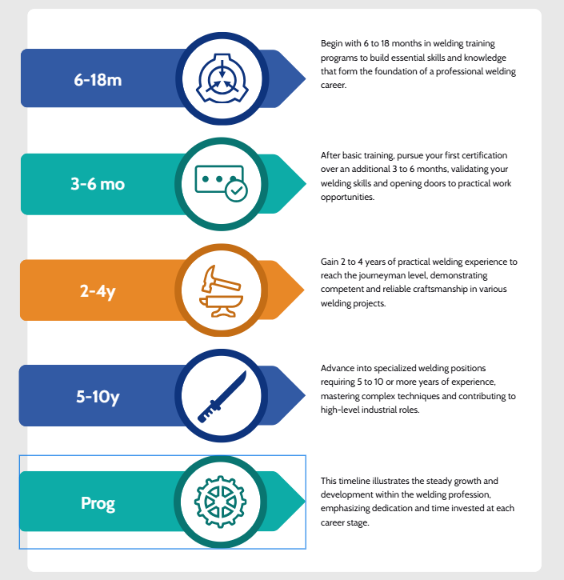
The Money Reality: Welding Salary Breakdown
Can Welders Make Six-Figure Salaries?
Absolutely! Here’s how different specializations stack up:
| Welding Career | Entry Level | Experienced | Top Performers |
|---|---|---|---|
| Underwater Welding | $60,000 | $120,000 | $200,000+ |
| Pipeline Welding | $50,000 | $80,000 | $150,000+ |
| Nuclear Welding | $55,000 | $85,000 | $120,000+ |
| Aerospace Welding Jobs | $45,000 | $70,000 | $100,000+ |
| Manufacturing Positions | $35,000 | $50,000 | $75,000+ |
Industry Demand: Are Welders in High Demand?
The short answer: absolutely. The welding job growth outlook shows 8% growth through 2031—faster than average for all occupations. Here’s where the action is:
Top Growth Industries:
- Construction and Infrastructure: Massive infrastructure spending is driving demand
- Energy Sector: Both traditional and renewable energy projects
- Manufacturing: Reshoring and automation creating opportunities
- Aerospace: Space exploration and defense contracts are expanding
Essential Skills for Success
Which Welding Skills Are Most Valuable for Career Advancement?
Hot Skills for 2025:
- Advanced TIG welding: Opens doors to aerospace and precision work
- Robotic programming: Future-proofs your career
- Non-destructive testing: Quality control expertise
- Blueprint reading: Essential for complex projects
- Project management: Leadership pathway
Facing the Reality: Challenges and Rewards
What Are the Dangers or Risks Associated with a Welding Career?
Modern welding is safer than ever, but risks remain:
Safety Considerations:
- Intense heat and bright light exposure
- Potential fume inhalation
- Physical demands and ergonomic challenges
- Some environments (underwater, heights) carry additional risks
Modern Safety Solutions:
- Advanced respiratory protection systems
- High-tech auto-darkening helmets
- Improved ventilation and fume extraction
- Comprehensive safety training programs
Your Next Steps: Launch Your Welding Career
For Complete Beginners:
- Research local welding training programs
- Visit welding shops and manufacturing facilities
- Start with MIG welding basics—most beginner-friendly
- Connect with industry professionals on LinkedIn
- Prepare for welding job interview questions
For Career Changers:
- Assess transferable skills (mechanical, technical, problem-solving)
- Consider accelerated certification programs
- Look into entry-level welding jobs with training opportunities
- Join welding associations and networking groups
For Advancing Welders:
- Target specialized certifications in growing fields
- Consider the certified welding inspector pathway
- Explore robotic welding technician opportunities
- Develop leadership and project management skills
The Future is Bright: Is Welding a Good Career Choice for the Future?
Despite fears of automation, welding remains remarkably human-centric. Here’s why your future is secure:
Future-Proof Factors:
- Complex repairs and custom fabrication still need human expertise
- Infrastructure needs are expanding, not shrinking
- Specialized environments (underwater, space, nuclear) require human judgment
- Quality control and inspection roles are growing
The Smart Strategy: Embrace technology rather than fear it. Robotic welding technician jobs and automated system maintenance represent the future of the industry.
Conclusion: Your Welding Adventure Starts Now
These 15 welding careers represent more than just jobs—they’re pathways to financial security, professional pride, and the satisfaction of building the world around us. Whether you’re drawn to the adventure of underwater welding, the precision of aerospace welding jobs, or the stability of manufacturing welder positions, there’s a path that fits your lifestyle and ambitions.
The welding industry isn’t just surviving in our high-tech world—it’s thriving. From infrastructure rebuilding to space exploration, skilled welders are the unsung heroes making it all possible.
Ready to strike while the iron’s hot? Choose your path from these 15 incredible welding careers, research the specific requirements, and start building the foundation for a future that’s built to last.
The sparks are flying, the opportunities are endless, and your welding adventure is waiting to begin. Which path will you choose?
Which of these 15 welding careers sparks your interest? Drop a comment below with your top choice, and I’ll help you create a personalized action plan to get started!

